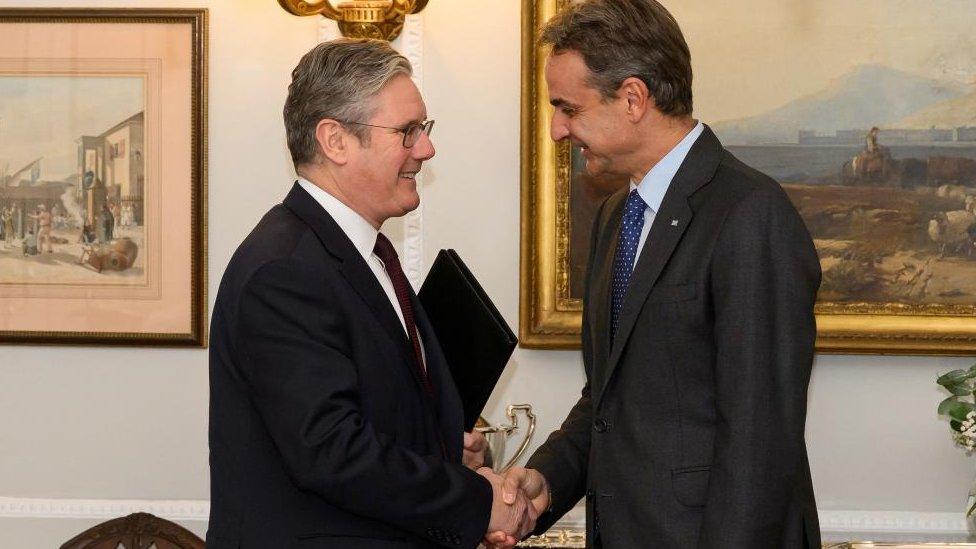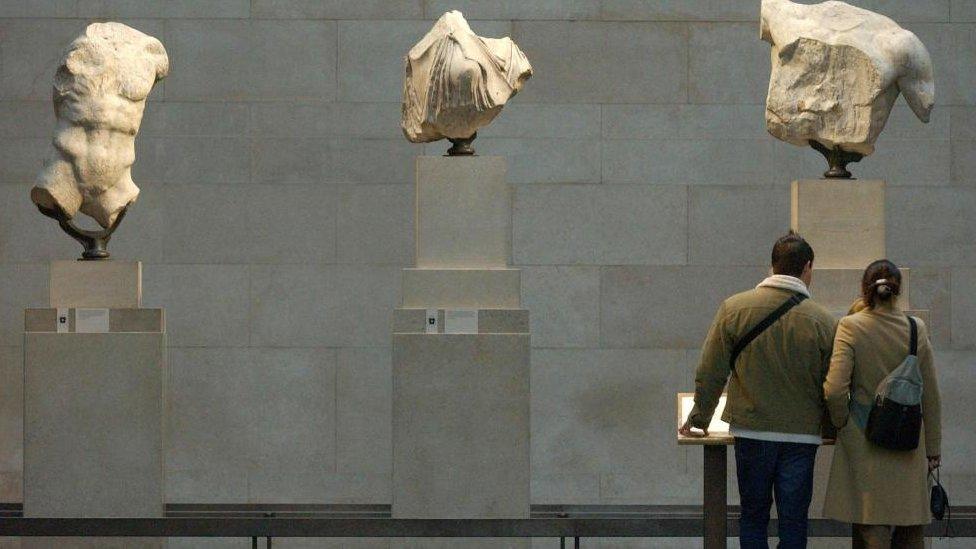PMQs: Rishi Sunak accuses Greek PM of grandstanding over Elgin Marbles
- Published
Labour leader Sir Keir Starmer claims Rishi Sunak has "lost his marbles" by cancelling a meeting with the Greek PM
Rishi Sunak has accused the Greek prime minister of trying to "grandstand" over the Parthenon Sculptures, also known as the Elgin Marbles.
Mr Sunak defended cancelling a meeting with the Greek PM this week.
At a fiery PMQs, Labour leader Sir Keir Starmer said: "Never mind the British Museum, it's the prime minister who has obviously lost his marbles."
The PM said it had become clear the meeting was "not to discuss substantive issues for the future".
He said it was "rather to grandstand".
There is widespread bafflement among Conservatives about the prime minister's decision to pick a public fight with Greece over the Elgin Marbles, the BBC's Political Editor Chris Mason reports.
"Why on earth are we still banging on about bloody marbles?" one senior Tory MP asked.
The MP argued that the party needs to be focusing on Labour's spending plans, not a 200-year-old disagreement with Athens.
"[Mr Sunak] is lousy at foreign affairs and would not have known the impact of such a snub," said a former cabinet minister.
"Every meeting we have with the Greeks involves us taking the same lines. And they also have theirs," the MP added, emphasising how long the UK and Greece have disagreed about the sculptures.
At PMQs, Sir Keir Starmer - who held a meeting with Mr Mitsotakis on Monday - said the Greek PM was "a fellow Nato member, an economic ally, one of our most important partners in tackling illegal immigration".
But instead of using a meeting with him to "discuss those serious issues", the prime minister "tried to humiliate him and cancelled at the last minute".
He asked: "Why such small politics?"
Mr Sunak said: "Of course, we're always happy to discuss important topics of substance with our allies, like tackling illegal migration or indeed strengthening our security.
"But when it was clear that the purpose of a meeting was not to discuss substantive issues for the future, but rather to grandstand and relitigate issues of the past, it was inappropriate.
"Furthermore ... when specific commitments and specific assurances on that topic were made to this country and then were broken, it may seem alien to him, but my view is when people make commitments they should keep them."

Mr Mitsotakis met Labour leader Sir Keir Starmer in London on Monday
The debate then turned to migration, with Mr Sunak claiming Sir Keir wanted closer cooperation with the EU, claiming the Labour leader backed "Brussels over Britain every single time".
Sir Keir accused the PM of suggesting that meeting the prime minister of Greece is "somehow supporting the EU instead of discussing serious issues".
He accused Mr Sunak of digging "further into that hole he's made for himself", adding: "Instead of dealing with the facts, he is prosecuting his own one-man war on reality."
Downing Street has claimed it received assurances that Mr Mitsotakis would not publicly push for the return of the Elgin Marbles during his visit, but the Greek leader discussed the topic with the BBC's Laura Kuenssberg on Sunday.

The Parthenon Sculptures, also known as the Elgin Marbles, are on display in the British Museum
Mr Mitsotakis has, meanwhile, said his falling out with Mr Sunak will not have a long-term impact on Greece and the UK's relationship.
After returning from his ill-fated trip to the UK, the Greek PM insisted that the two countries enjoy a relationship of "significant historical depth" which would not be negatively affected by the spat.
He claimed events in London had actually benefitted the Greek people.
"There was a positive side to the cancellation of this meeting," he said.
"That the fair request of Greece for the reunification of the Parthenon Sculptures gained even more publicity, not only in the UK, but also to the global public opinion."
Earlier on Wednesday, Greece's foreign minister had said he hoped the two countries needed to work together to find a solution to return the marbles to Greece.
Giorgos Gerapetritis, who met his British counterpart Lord Cameron on Tuesday after the row had escalated, said: "The reunification of the Parthenon sculpture is a claim based not only on history and justice but also on ecumenical cultural value."
The Elgin Marbles is the name commonly used for a collection of ancient Greek treasures from the Parthenon in Athens which were taken and brought to the UK by British diplomat Lord Elgin in the early 19th Century.
They have been in the British Museum since 1832, aside from a stint in Aldwych Tube station during World War Two to prevent damage and one marble being loaned to a Russian museum in 2014.
Both Greece and the UK have long-standing positions on the sculptures.